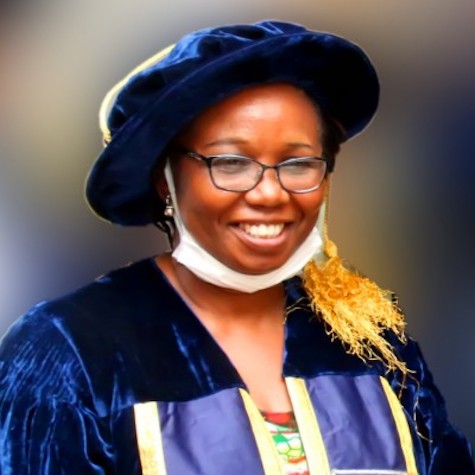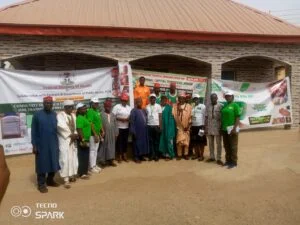Education
Don Canvasses Establishment of Centre for Tropical Diseases

From Joseph Amedu, Lokoja
University don and Professor of Parasitology and Entomology, Jacqueline Azumi Badaki has called for establishment of a Center for Neglected Tropical Diseases (NTDs) with a focus on improved disease management in areas of diagnostics, preventive treatments, research and capacity building.
Badaki made the call in her Inaugural Lecture titled: “The Endless War Between Neglected Tropical Diseases and Overlooked Populations” at the Federal University, Lokoja (FUL) on Wednesday.
In the Lecture, which is the 12th in the Federal University Lokoja Inaugural Lecture series, Badaki said that though the nation had recorded tremendous success in elimination of few NTDs, there were threats from parasitic diversity and resilience especially in rural population.
She said that Such a center could also take the lead in advocacy for improved financing of NTDs control and health policy researches that could inform new strategies for the control and elimination of NTDs in the country.
She called for Political will on the part of government towards financing as well as institutional commitment and enabling working environment urging that sensitivity of government towards the health situation of the people should go beyond rhetorics.
“We should begin conversations and research around what is going on in the world of the parasites so that we are not taken unawares in the future.
According to her, in 2015 the World Health Organization (WHO) recognized 20 NTDs and two years later, the Federal Ministry of Health (FMOH) recognized nine diseases as NTDs of public health importance in Nigeria.
They include; Trachoma, Burult ulcer, Trypanosomiasis, Dengue Fever, Schistosomiasis, Dengue Fever, Schistosomiasis, River Blindness, Lymphatic Filariasis (LF), Onchocerciasis and Soil Transmitted Helminthes (worm infections).
“As at 2020, according to WHO, 863 million people were at risk of lymphatic filariasis with 25 million men living with hydrocoele and over 15 million people with lymphoedema.
“Note that Nigeria is the highest contributor to these estimates. Yet, NTDs receive only 0.6 per cent health fund of official development assistance unlike HIV/AIDS, malaria and tuberculosis that collectively receive above 50 per cent”, Badaki said.
She held that a lot of the diseases could be controlled with improved sanitation and hygiene and therefore, called for good and accessible sanitary facilities and safe water supply.
Prof. Badaki urged researchers to market their research findings saying that it was not enough for them to publish their research works in journals but should go extra to market their research products using digital marketing.
She called on those with interest in infectious diseases research to explore WHO training grants rather than overload TETFund.
Prof. Olayemi Akinwumi, Vice Chancellor of Federal University Lokoja (FUL) commended the Inaugural Lecturer for the lecture saying that she had met one of the academic requirements that qualified her as a professor of FUL and declared: ‘She is discharged and acquitted.”
Akinwumi also thanked the Governing Council of the University for the opportunity granted the professor and urged the academia and guests to get copies of the lecture for proper digestion and their libraries.
The Adamawa born Professor of Parasitology and Entomology has had over 22 years of community interactive research experience and has served on several WHO/APOC missions in different capacities such as technical adviser, independent monitor and Program Evaluator, Consultant Evaluator/Scientist for several NTD in different countries.
Education
How female Medicine Degree Holder Abandoned Certificate for Carpentry- Bugaje

The Executive Secretary, National Board for Technical Education (NBTE), Prof. Idris Bugaje has expressed the need to promote inclusivity, especially for women and persons with disabilities in technical education.
Bugaje stated this in Abuja while assessing the impact of President Bola Tinubu’s administration after two years in office.
He appealed for greater gender inclusivity in vocational and technical education, stressing that deliberate policies such as scholarships and incentives could help bridge the gender gap.
In support of his position, Bugaje shared an inspiring story of a female medical doctor who abandoned her medical career to pursue carpentry.
“There is a story I want to share with you, about a girl who was interested in becoming a carpenter.
“The father was a carpenter and they were four children in the family, three boys and herself.
“Whenever she joined the boys to the workshop, the father would send her away, saying, `you are a girl, go back to the house, you are not supposed to be a carpenter’’.
“Without giving considerations to the passion of the young girl, the father sent her to a medical school.
“She graduated with the MBBS, went and did the one-year internship after graduation, and chose a role as a medical doctor.
“After that, she came back to the father, returned the MBBS certificate to him, and thanked him.
“Afterward, she told the father that her passion is in carpentry, not to practice as medical doctor,” Bugaje narrated
He added that after spending seven years on medical training, the father had no option but to send her to Turkey to learn how to make furniture.
Addressing cultural and societal barriers often faced by young women in technical fields, Bugaje appealed to parents to support their daughters’ interests in trades like plumbing, electrical installation, and carpentry.
He also called on policymakers to prioritise passion and skill development among youth, especially girls, noting that such encouragement could lead to greater innovation and self-reliance.
“If they want to become carpenters, ICT experts, or POP artists, allow them.
“In skills’ training, passion is very important. That’s what motivates children and helps them innovate.
“We need to harness these innovations if the country is to move forward and rise beyond being a third-world nation,” he said.
He emphasized the need to have deliberate policies to encourage women to come into TVET through scholarships and other incentives. (NAN)
Education
WAEC Apologies for Conducting English Exam Late, Cites Leakage Prevention

The West African Examinations Council (WAEC) has apologized for delay in conducting English Language Paper 2 in the ongoing 2025 West African Senior School Certificate Examination (WASSCE).
The took place on Wednesday evening.
In a statement by Moyosola Adesina, Acting Head of Public Affairs Department of
WAEC, the council said that it encountered challenges.
”While maintaining the integrity and security of our examination, we faced considerable challenges primarily due to our major aim of preventing leakage of any paper.
“We recognise the importance of timely conduct of examinations and the impact of this decision on candidates, their schools and parents, and we sincerely apologise for any inconveniences caused,” WAEC stated.
It said that it successfully achieved its objective but it inadvertently impacted the timeliness and seamless conduct of the examination.
“In spite of our best efforts, we encountered logistical hurdles, security concerns and socio-cultural factors that negatively influenced our operations,” WAEC said.
The council re-affirmed its commitment to upholding the highest standard in examination conduct, and pledged to continue to promote academic excellence. (NAN)
Education
FG vows full WAEC CBT shift by 2026 – Minister

The Minister of Education, Dr Tunji Alausa, has reaffirmed the Federal Government’s commitment to fully transitioning to Computer-Based Test (CBT) examinations for the West African Examinations Council (WAEC) and other exam bodies by 2026.
Dr Alausa made this known while monitoring the conduct of WAEC’s CBT examinations in Abuja on Wednesday.
He expressed optimism about Nigeria’s capacity to modernise its examination system and reduce widespread malpractice through digital innovation.
Commending WAEC’s initiative, the minister described the shift from traditional pen-and-paper exams to CBT as a historic and crucial step toward fairness and educational integrity.
“We are working very hard to eliminate fraud in our exam system, and WAEC is taking the lead,” he said.
Highlighting the advantages of CBT, Alausa noted that the system simplified the exam process while significantly curbing cheating.
“We now have clear evidence that when exams are done using technology, the level of fraud is minimised to almost zero,” he stated.
He further lauded WAEC’s internal safeguards, explaining that the CBT system was operated via a secured Local Area Network (LAN), making it “literally impossible” to hack.
According to the minister, by Nov. 2025, all WAEC multiple-choice exams will be conducted using CBT.
He added that essay questions and NECO examinations would follow suit by 2026.
On infrastructure and logistics, particularly in remote areas, Alausa acknowledged the challenges but assured that scalable solutions are in progress.
“Are we going to be ready to provide every single needed infrastructure by November? Absolutely not.
“But as we move into the future, we will be ready. We have to challenge ourselves as government,” he said.
He also addressed concerns over the logistics of conducting multiple exams.
“In WAEC, the average student takes about eight to nine papers.
“They do it over several days. Those are the logistics we, as administrators, have to work through, and we already are,” he explained.
The ongoing WAEC exams, which began on April 24, are scheduled to conclude on June 20, 2025.
A total of 1,973,253 candidates from 23,554 schools are participating. Of this number, 979,228 candidates are male, accounting for 49.63 per cent, while 994,025 candidates are female, making up 50.37 per cent.(NAN)























